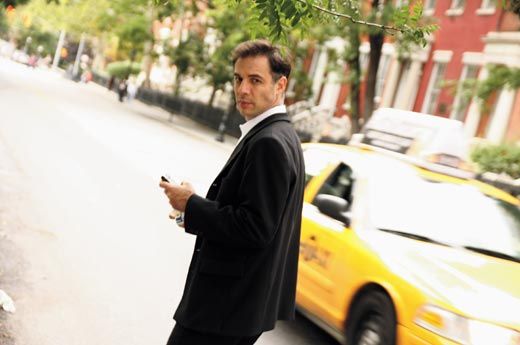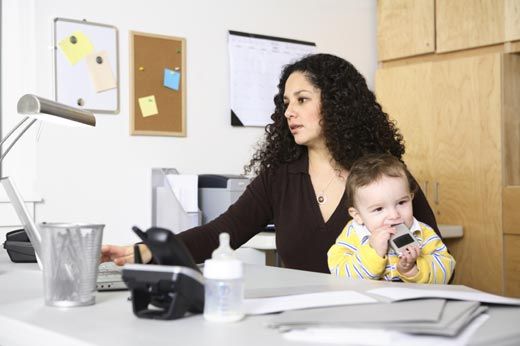The Journey to Elsewhere, U.S.A.
A professor explains how new technology drastically altered the modern American family unit
/https://tf-cmsv2-smithsonianmag-media.s3.amazonaws.com/filer/mother-child-work-cell-phone-631.jpg)
What is this distracted, rootless place, where kids eschew stuffed animals in favor of online avatars, buzzing iPhones interrupt family dinners and the workday stretches late into the night?
Dalton Conley, a social sciences professor at New York University, calls it, simply, “elsewhere,” and his new book tracks the social and economic changes of the last three decades that landed us here. Elsewhere, U.S.A.: How We Got From the Company Man, Family Dinners, and the Affluent Society to the Home Office, Blackberry Moms, and Economic Anxiety shows how the death of the old ways (auto workers’ unions, coal mines) and the birth of new (air conditioning, tip jars and the three-bathroom home, for starters) have contributed to our present predicament, where no one has the time or presence of mind to concentrate on anything at all, even our children’s voices. Even so, the author took a few moments to speak with us and guide us through this new and lonely landscape:
Where is Elsewhere, USA?
Elsewhere, U.S.A. is, ironically, everywhere. It’s really about a state of mind, (where you are) occupying multiple nonphysical locations at one time, managing data streams not only in your immediate environment, but from a laptop or BlackBerry or iPod, having emails come in and at the same time being on Facebook. All the spheres – home, work, social life – have collapsed into each other. It’s a different texture of life.
How did Mr. 2009, as you dub modern man, and Mrs. 2009 get into this mess?
I don’t think they had much choice. There is, of course, the changing technological landscape: the beeping, buzzing, flashing machines around us, demanding our attention. Those are the obvious things. The other forces include rising economic inequality and the increased labor force participation of women, especially moms.
How will their children cope?
It’s really my generation – I’m about to be 40 – that’s the most discombobulated by all this. People in their 70s are in their pre-techno bubble, doing things they way they’ve always done. The kids have no collective nostalgia or sense things were different once, because this is all they’ve ever known. They’re toggling back and forth between games and talking to friends and they have an enormous amount of overscheduled structured activities. And maybe that’s what they need. That’s what it’s like to be an American today, to be overscheduled, behind on work, and managing multiple data streams. So we are preparing them well, so to speak.
What is an “intravidual,” as opposed to an individual?
It’s the notion that whereas once we had a coherent, private self that we had to discover and then use to guide our choices, values and actions, the intravidual is about learning how to manage multiple selves and respond to multiple data streams in virtual places. The idea is not to find a core of authenticity but to learn to balance.
You talk about the stigma of leisure, and how leisure has become something for the poor.
It used to be as your income rose you bought more leisure – leisure was like a color TV or a car, a good you consumed, time you took off. Now when you earn more money you think about how much more it costs you to take off because you’re worth more. Opportunity cost trumps the desire to take time off. Standing still means falling behind.
What did your field trip to the Google headquarters teach you?
They were really ahead of the curve in terms of making their work environment very homey. They provide everything a 1950s housewife would have provided. Do your laundry. Give you a massage. Great food for free. At first glance it seems like a very expensive strategy, but I think it’s brilliant. People don’t want to go home. There’s a volleyball court and board games around. It feels like a college campus. And Google gets more out of each worker.
You mentioned the urinals at Google.
In English or Irish pubs they pin the sports pages over men’s urinals so you can read while relieving yourself. At Google they put up coding advice. It felt a little 1984.
You discuss “two-rooms,” day care centers-cum-office buildings where parents can watch their children while working. How else will the physical architecture of Elsewhere be changing in the near future?
I might imagine that you’ll find more integration of housing and firms, the return of the 19th century “company town.” A place like Google could start building housing, like dorms, around their campus, for underpaid programmers, rather than have them waste all this time commuting. They could just live there.
How do we return from Elsewhere?
It’s not an option, I’m sorry to say. It’s not going to go in reverse. It could be that we have lower inequality because of the decline of the stock market and so on, but I think that will be a temporary blip. What we’re really going to see is this trend going forward.
Can’t we just turn off our BlackBerrys? What about free will?
I have heard stories of people who sell the business and pack up and move to rural Maine, and I think it’s interesting that people would do something so drastic. I guess that’s what it takes. But for most of us it’s more about managing these flows than turning back the clock.

